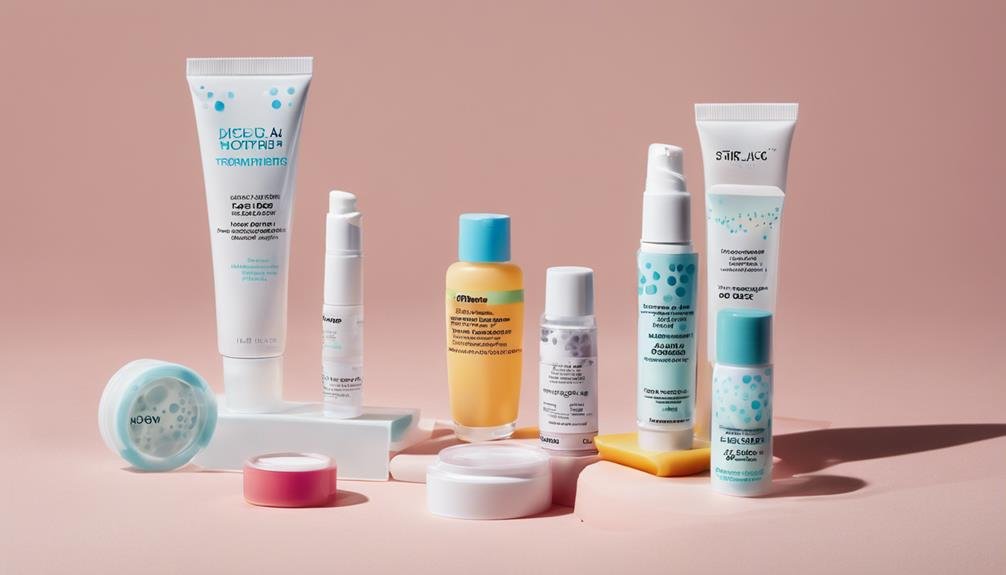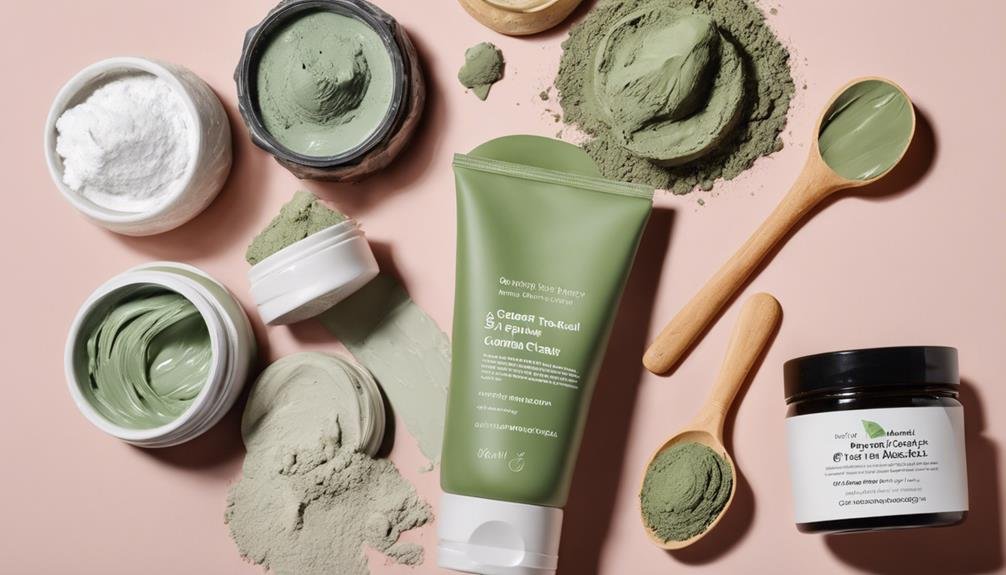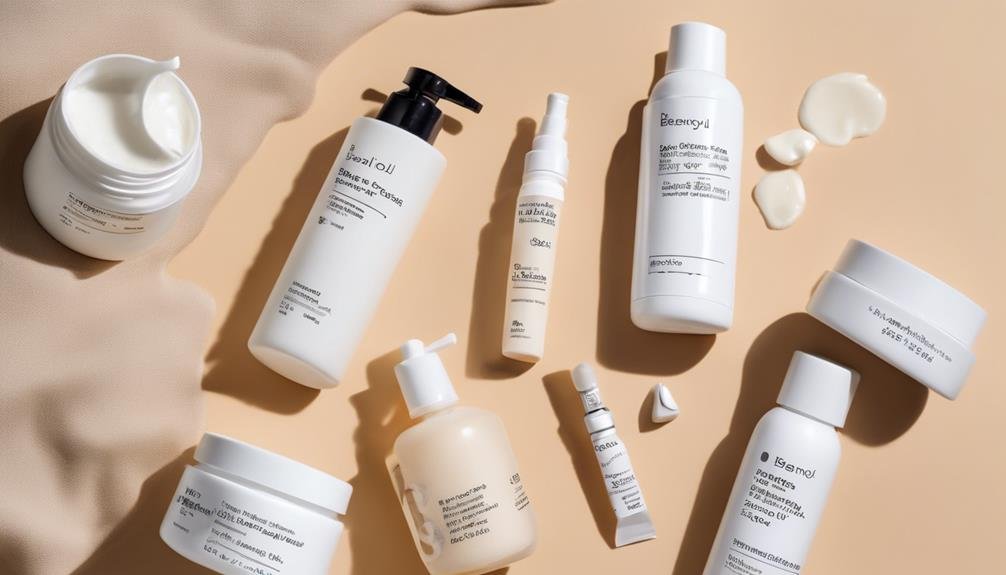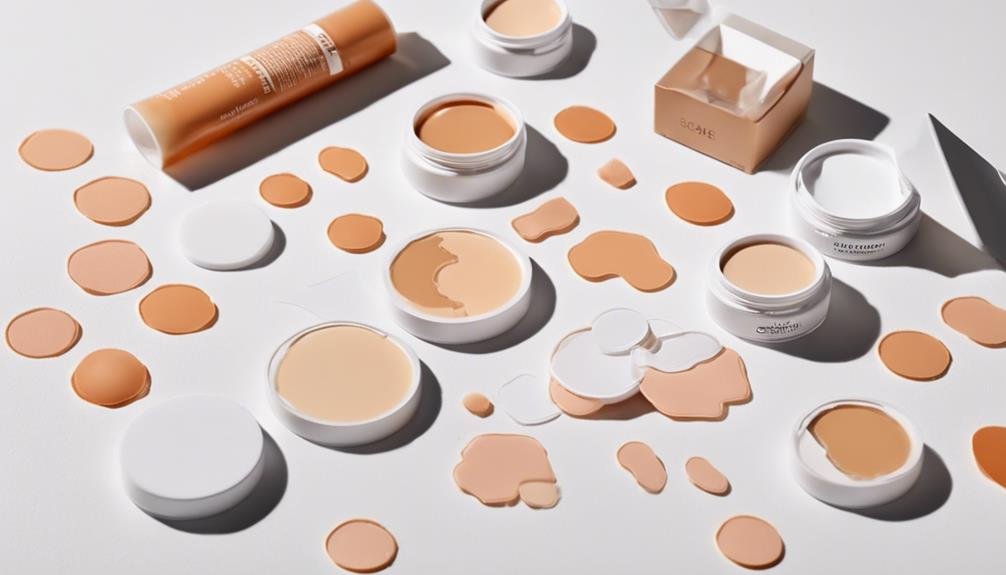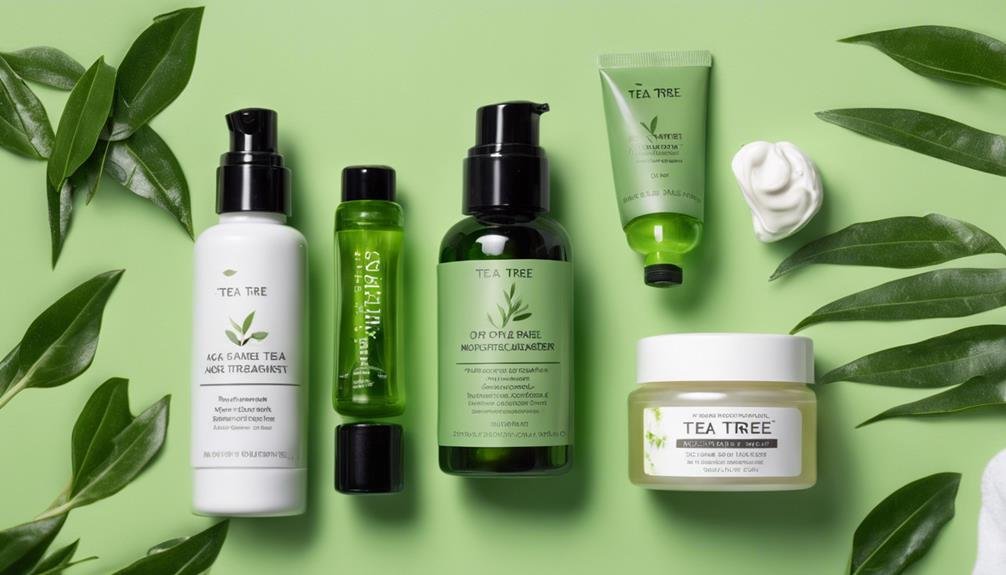If you're struggling with acne-prone skin, finding the right products can make a significant difference in your skincare routine. From gentle cleansing gels to targeted spot treatments, each step plays a crucial role in managing breakouts and maintaining clear skin. But with so many options available, how do you know which products will truly work for you? It's all about understanding your skin's unique needs and finding the perfect balance of ingredients that can help you achieve that coveted clear complexion.
Key Takeaways
- Opt for non-comedogenic cleansing gel with salicylic acid or benzoyl peroxide for clear skin.
- Use a salicylic acid toner (0.5%-2%) to exfoliate and reduce inflammation gently.
- Clay mask draws out impurities, unclogs pores, and reduces inflammation for clearer skin.
- Benzoyl peroxide cream targets acne-causing bacteria and reduces inflammation effectively.
- Hydrate with an oil-free moisturizer containing hyaluronic acid, glycerin, or ceramides for a healthy barrier.
Cleansing Gel
When dealing with acne-prone skin, finding the right cleansing gel is crucial for maintaining a clear and healthy complexion. Look for a gentle cleanser that's non-comedogenic, meaning it won't clog your pores. Ingredients like salicylic acid or benzoyl peroxide can be beneficial for acne-prone skin as they help to unclog pores and reduce inflammation. It's essential to cleanse your face twice a day, in the morning and evening, to remove dirt, oil, and impurities that can contribute to breakouts.
Opt for a cleansing gel specifically formulated for acne-prone skin to target excess oil production and bacteria. Avoid harsh ingredients like alcohol or fragrances that can irritate your skin further. Instead, choose a gentle formula that balances oil production without stripping your skin of its natural moisture.
Remember to follow up with a lightweight, oil-free moisturizer to keep your skin hydrated without clogging pores. By incorporating a suitable cleansing gel into your skincare routine, you can help prevent breakouts and maintain a healthy complexion.
Salicylic Acid Toner
For individuals struggling with acne-prone skin, incorporating a salicylic acid toner into their skincare regimen can be highly beneficial. Salicylic acid is a beta-hydroxy acid that penetrates deep into the pores, effectively exfoliating the skin and unclogging pores. This helps to prevent acne breakouts and minimize their occurrence.
When choosing a salicylic acid toner, opt for a product with a concentration between 0.5% to 2% for best results without causing excessive dryness or irritation.
Salicylic acid toners work by dissolving the bonds that hold the skin cells together, promoting gentle exfoliation and revealing smoother, clearer skin. They also have anti-inflammatory properties that can help reduce redness and swelling associated with acne.
To incorporate a salicylic acid toner into your skincare routine, apply it after cleansing and before moisturizing. Use it once or twice daily, depending on your skin's tolerance and the product's instructions. Remember to follow up with sunscreen during the day, as salicylic acid can increase skin sensitivity to the sun.
Spot Treatment
To effectively target and treat individual blemishes, incorporating a spot treatment into your skincare routine can provide targeted care for acne-prone skin. Spot treatments are specifically formulated to address isolated breakouts, delivering potent ingredients directly to the affected area.
Look for products containing ingredients like benzoyl peroxide, sulfur, or tea tree oil, known for their acne-fighting properties.
When choosing a spot treatment, consider your skin type and the severity of your acne. For oily skin, opt for a lightweight gel or serum formula that won't clog pores. If you have sensitive skin, choose a gentler option to avoid irritation.
It's essential to apply the spot treatment directly onto the blemish, avoiding surrounding healthy skin to prevent dryness or peeling.
Consistency is key when using spot treatments. Apply a thin layer to clean, dry skin once or twice a day, following the product instructions carefully. With regular use, spot treatments can help reduce the size and redness of blemishes, promoting clearer, healthier skin.
Oil-Free Moisturizer
An essential component of a well-rounded skincare routine for acne-prone skin is an oil-free moisturizer. When choosing a moisturizer, opt for non-comedogenic formulas that won't clog pores or exacerbate acne. Oil-free moisturizers provide the necessary hydration without adding excess oil to your skin, helping to balance moisture levels and prevent breakouts. Look for ingredients like hyaluronic acid, glycerin, or ceramides, which hydrate the skin without leaving a greasy residue.
To help you make an informed decision, here is a comparison table of popular oil-free moisturizers for acne-prone skin:
| Brand | Key Ingredients |
|---|---|
| Cetaphil | Hyaluronic Acid, |
| Glycerin | |
| Neutrogena | Hyaluronic Acid, |
| Salicylic Acid | |
| La Roche-Posay | Niacinamide, |
| Ceramides | |
| Aveeno | Feverfew Extract, |
| Oat Kernel Extract |
Choose a moisturizer that suits your skin's specific needs and helps maintain a healthy skin barrier while addressing acne concerns.
Clay Mask
When considering skincare treatments for acne-prone skin, incorporating a clay mask into your routine can be highly beneficial. Clay masks are renowned for their ability to draw out impurities, excess oil, and toxins from the skin, making them a valuable addition to your skincare regimen. The absorbent properties of clay help unclog pores, reduce inflammation, and promote a clearer complexion.
Clay masks work by absorbing oil and impurities from the skin's surface, making them particularly effective for those with oily or acne-prone skin. They can help reduce the appearance of blackheads, whiteheads, and acne breakouts. Additionally, clay masks can provide a gentle exfoliation, removing dead skin cells and promoting cell turnover.
When using a clay mask, it's essential to follow the instructions carefully to avoid over-drying or irritating your skin. Start by applying a thin, even layer to clean skin and leave it on for the recommended time before rinsing off with warm water.
Incorporating a clay mask into your skincare routine once or twice a week can help improve the overall health and appearance of your skin.
Retinol Serum
For those with acne-prone skin, incorporating a retinol serum into your skincare routine can be a game-changer. Retinol, a derivative of vitamin A, is known for its ability to promote skin cell turnover, unclog pores, and reduce inflammation, making it an effective treatment for acne. When selecting a retinol serum, opt for a product with a concentration between 0.25% to 1% to avoid irritation while still reaping the benefits.
Retinol serums work by accelerating the shedding of dead skin cells, preventing them from clogging pores and causing breakouts. Additionally, retinol helps to stimulate collagen production, improving skin texture and reducing the appearance of acne scars over time.
To incorporate retinol serum into your routine, start by using it 2-3 times a week in the evening, gradually increasing frequency as your skin builds tolerance. Remember to always follow up with a moisturizer and sunscreen during the day, as retinol can increase your skin's sensitivity to the sun.
Benzoyl Peroxide Cream
Introducing Benzoyl Peroxide Cream, a powerful topical treatment proven to effectively target acne-causing bacteria and reduce inflammation. This cream is a staple in acne-fighting routines due to its ability to penetrate deep into the pores, where it works to eliminate the bacteria responsible for breakouts. Benzoyl peroxide also helps to unclog pores, preventing new blemishes from forming.
When using Benzoyl Peroxide Cream, start with a lower concentration to assess your skin's tolerance. Gradually increase the strength as needed. It's important to follow the instructions provided and to use sunscreen during the day, as this treatment may increase skin sensitivity to the sun.
For best results, apply a thin layer of the cream to clean, dry skin once or twice daily. Allow it to fully absorb before applying other products. Remember, a little goes a long way – using too much can lead to dryness and irritation. Incorporating Benzoyl Peroxide Cream into your skincare routine can help you achieve clearer, healthier-looking skin.
Gentle Exfoliator
To effectively address acne-prone skin, incorporating a Gentle Exfoliator into your skincare routine can make a significant difference in maintaining clear and smooth skin. Gentle exfoliation helps remove dead skin cells, unclog pores, and reduce the likelihood of breakouts. When choosing a Gentle Exfoliator, look for products with ingredients like salicylic acid or glycolic acid, which are effective yet gentle on sensitive skin.
- Soft Beads: Imagine tiny, soft exfoliating beads delicately buffing away dead skin cells without irritating your skin.
- Calming Botanicals: Envision a soothing blend of botanical extracts like chamomile and aloe vera, calming any redness or inflammation caused by acne.
- Refreshing Scent: Picture a refreshing exfoliator with a light, invigorating scent that makes your skincare routine a delightful experience.
Incorporating a Gentle Exfoliator into your skincare regimen can help improve the texture and appearance of your skin, leaving you with a radiant complexion free from acne blemishes.
Acne Patches
Gently and effectively targeting individual acne spots, Acne Patches have gained popularity for their targeted approach in treating blemishes. These patches work by creating a protective barrier that locks in moisture and encourages the skin to heal faster. They also prevent you from picking or touching the blemish, reducing the risk of scarring and further infection.
When it comes to choosing the right Acne Patch, consider factors like the patch size, ingredients, and how well it adheres to the skin. Here is a comparison table to help you make an informed decision:
| Feature | Acne Patch A | Acne Patch B |
|---|---|---|
| Patch Size | Small | Large |
| Ingredients | Salicylic Acid, Tea Tree Oil | Hydrocolloid, Calendula Extract |
| Adherence | Strong | Moderate |
| Skin Irritation | Low | Minimal |
| Overnight Wear | Yes | Yes |
Hyaluronic Acid Serum
If you're looking to complement your acne treatment routine with a hydrating and skin-plumping solution, consider incorporating a Hyaluronic Acid Serum. This serum is a lightweight, clear substance that can hold up to 1,000 times its weight in water, making it an excellent hydrator for acne-prone skin. Here are some reasons why Hyaluronic Acid Serum could be beneficial for your skin:
- Intense Hydration: The serum penetrates deep into the skin, providing intense hydration without clogging pores.
- Plumping Effect: By attracting and retaining moisture, Hyaluronic Acid can help plump up the skin, reducing the appearance of fine lines and wrinkles.
- Soothing Properties: It has soothing properties that can help calm irritated skin and reduce redness associated with acne.
Incorporating a Hyaluronic Acid Serum into your skincare routine can help hydrate and nourish your skin without exacerbating acne.
Tea Tree Oil
Considered a popular natural remedy for acne, Tea Tree Oil is a powerful essential oil known for its antibacterial and anti-inflammatory properties. This potent oil is derived from the leaves of the Melaleuca alternifolia plant native to Australia. Tea Tree Oil works by penetrating the skin and targeting the bacteria that can cause acne breakouts. Its anti-inflammatory properties help reduce redness and swelling associated with acne, making it an effective treatment for both existing blemishes and preventing new ones from forming.
When using Tea Tree Oil for acne-prone skin, it's essential to dilute it with a carrier oil to prevent skin irritation. A concentration of around 5% Tea Tree Oil is generally well-tolerated and effective. You can apply it directly to the affected areas using a cotton swab or mix a few drops into your moisturizer for easier application.
Tea Tree Oil's natural properties make it a valuable addition to your skincare routine, helping combat acne without harsh chemicals.
Mineral Sunscreen
Mineral sunscreen is a vital component of any skincare routine, particularly for individuals with acne-prone skin. When choosing a mineral sunscreen, look for products that contain zinc oxide or titanium dioxide as active ingredients. These minerals provide broad-spectrum protection without clogging pores, making them ideal for sensitive and acne-prone skin.
- Non-Comedogenic Formulas: Opt for mineral sunscreens labeled as non-comedogenic to prevent pore blockages and breakouts.
- Matte Finish: Seek mineral sunscreens with a matte finish to avoid a greasy or shiny appearance on your skin.
- Water-Resistant: Choose a water-resistant mineral sunscreen to ensure protection even during outdoor activities or on hot, humid days.
Frequently Asked Questions
Can These Products Be Used Together in a Skincare Routine?
Yes, these products can be used together in a skincare routine. It is essential to layer them from thinnest to thickest consistency for optimal absorption and effectiveness. Consistent use and monitoring for any adverse reactions are key.
How Long Does It Typically Take to See Results?
Once you embark on this skincare journey, results start appearing in about 4-6 weeks. Consistency is key to achieving clear, radiant skin. Remember, Rome wasn't built in a day – give your skin the time it needs to flourish.
Are These Products Safe for Sensitive Skin?
Yes, these products are safe for sensitive skin. They are formulated to be gentle and non-irritating, making them suitable for those with sensitive skin. Always do a patch test and consult a dermatologist if unsure.
Can These Products Be Used During Pregnancy?
Yes, these products can be safely used during pregnancy. Consult with your healthcare provider to ensure they align with your skincare routine. Look for ingredients like glycolic acid and benzoyl peroxide, known to be safe during pregnancy for acne-prone skin.
Do These Products Have Any Potential Side Effects?
Potential side effects of these products vary but can include skin irritation, dryness, or increased sensitivity. Always perform a patch test and consult a dermatologist. Remember, skincare is personal; what works for others may not work for you.
Conclusion
In conclusion, incorporating these best products for acne-prone skin into your skincare routine can help you achieve clearer and healthier skin. Remember to cleanse with a gentle gel, use a salicylic acid toner to unclog pores, and apply targeted treatments like spot treatments and benzoyl peroxide creams. Don't forget to hydrate with an oil-free moisturizer and protect your skin with a mineral sunscreen. Stay consistent with your routine and you'll see results in no time!



